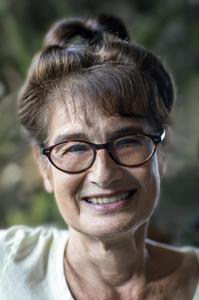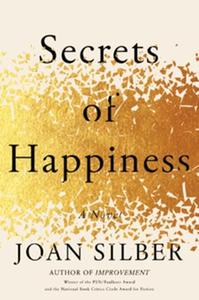
|
|
| photo: Shari Diamond | |
Joan Silber is the author of nine books of fiction. Her last novel, Improvement, won the National Book Critics Circle Award and the PEN/Faulkner Award, and she received the PEN/Malamud Award for Excellence in the Short Story. Her book Fools was longlisted for the National Book Award and was a finalist for the PEN/Faulkner Award; The Size of the World was a finalist for the Los Angeles Times Fiction Prize; and Ideas of Heaven was a finalist for the National Book Award and the Story Prize. She lives in New York, taught for many years at Sarah Lawrence College, and teaches in the Warren Wilson MFA Program. Her novel Secrets of Happiness (Counterpoint, May 4, 2021) is a profound story about the true value of family, however it may be defined in the modern era.
On your nightstand now:
Hamnet by Maggie O'Farrell: A friend gave me this--she thought Shakespeare's wife was a topic I'd want--and I'm totally transfixed.
Shuggie Bain by Douglas Stuart: I got interested because of its nomination for so many awards--I'm struck by how slum life in Glasgow is both like and unlike what we know.
The Social Life of Opium in China by Zheng Yangwen: this is for something I might be writing. Scholarly but full of surprises.
Favorite book when you were a child:
I was a big Louisa May Alcott fan--I had all her books. She can seem preachy now, but I loved the way she took the moral lives of children seriously. Another favorite was A Girl of the Limberlost by Gene Stratton Porter. A friend gave me a copy recently to re-read it. A neglected girl gets obsessed with moths and collecting specimens; the story has ambitious thoughts about nature that I think appealed to me greatly.
Your top five authors:
Anton Chekhov and Alice Munro are the writers who've had the deepest effect on my own writing. I've also loved Colm Tóibín and David Malouf. Favorite books in the past few years are A Little Life by Hanya Yanagihara and Disappearing Earth by Julia Phillips. (I know that's six.)
Book you've faked reading:
I wrote a fake book report on Don Quixote in ninth grade. I had seen a TV version and wrote eloquently about Quixote dying "in tragic triumph." When the teacher praised it in class, I naturally bragged to other kids about my fibbing, much to the dismay of the good student whose report had been used as a bad example.
 Book you're an evangelist for:
Book you're an evangelist for:
I've given away many copies of Julia Phillips's Disappearing Earth. It has amazing suspense, while using the form of linked pieces that I love.
Book you've bought for the cover:
I bought it because I love her writing, but one of my favorite covers is Andrea Barrett's The Voyage of the Narwhal, with its mountains of ice.
Book you hid from your parents:
Peyton Place by Grace Metalious. It was a bestseller considered very smutty. (I think it was sort of smutty, in that the sex was mostly ill-natured.) My mother was liberal but had her limits. They later made it into a cleaned-up soap opera.
Book that changed your life:
Best Known Works of Anton Chekhov. My father, who died when I was five, was a great collector of books, and this one has his signature.
Favorite line from a book:
"And it seemed as though in a little while the solution would be found, and then a new and splendid life would begin; and it was clear to both of them that they had still a long, long road before them, and that the most complicated and difficult part of it was only just beginning." --last line from Chekhov's "The Lady with the Dog"
Five books you'll never part with:
Books by friends:
She Read to Us in the Late Afternoons by Kathleen Hill
Whistling by Myra Goldberg
The Boy in the Field by Margot Livesey
The Sun Collective by Charles Baxter
Because We Are Here by Chuck Wachtel
Book you most want to read again for the first time:
A book I did re-read with enormous pleasure was Dickens's Great Expectations--I escaped into it after the election of 2016. It's a novel fully aware of evil--and the vices of ambition--and yet it took me elsewhere.
As it happened, soon after, I was a volunteer teacher of English in Laos for a month. One of my students, a teenage novice monk in Luang Prabang, asked if he could write a story about a book he was reading. And he wrote a version of the scene when Pip brings food to the prisoner on the marsh! I couldn't believe it--we were both thrilled. And I felt that the novel's points about money and class and loyalties made perfect sense to him.

